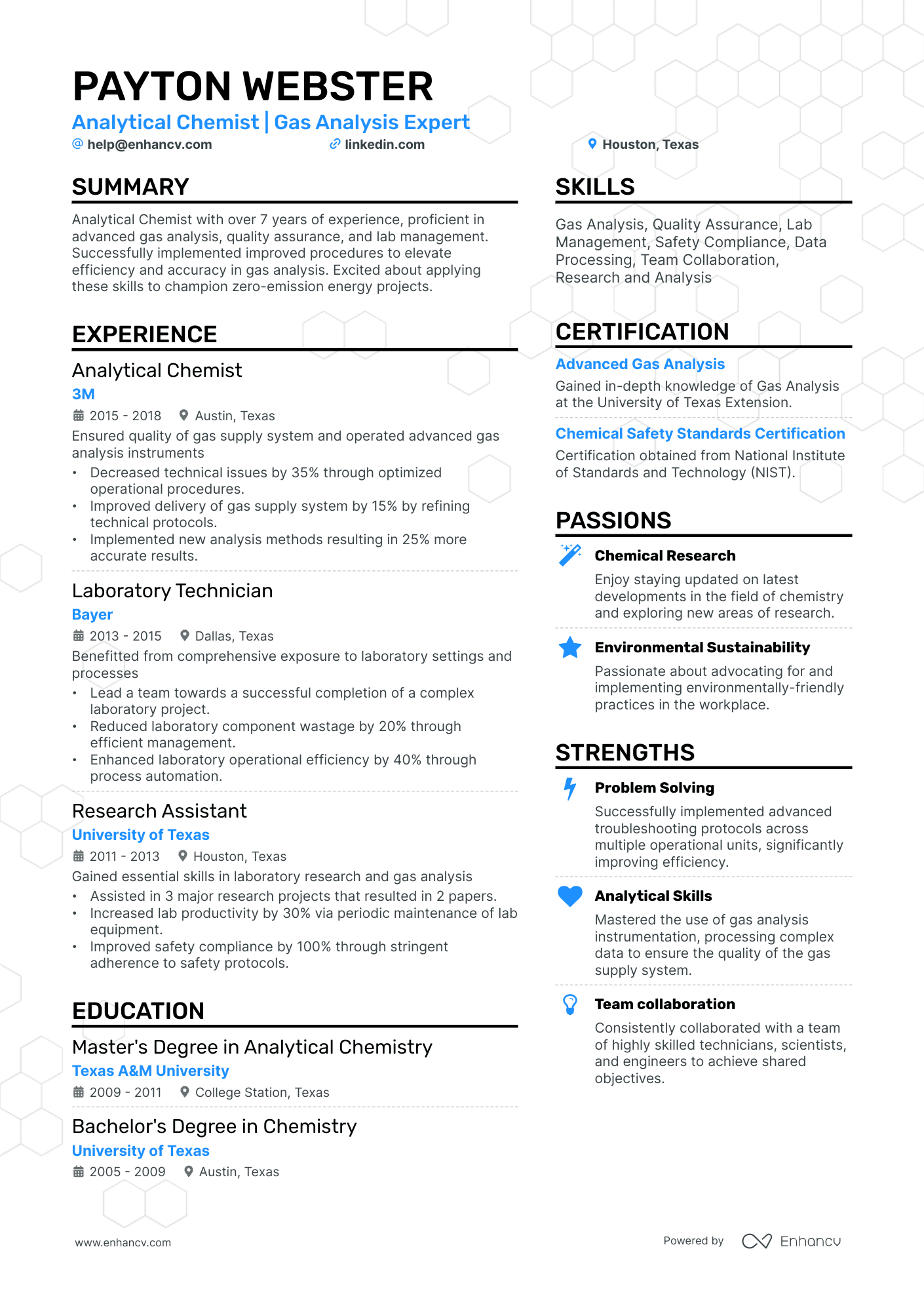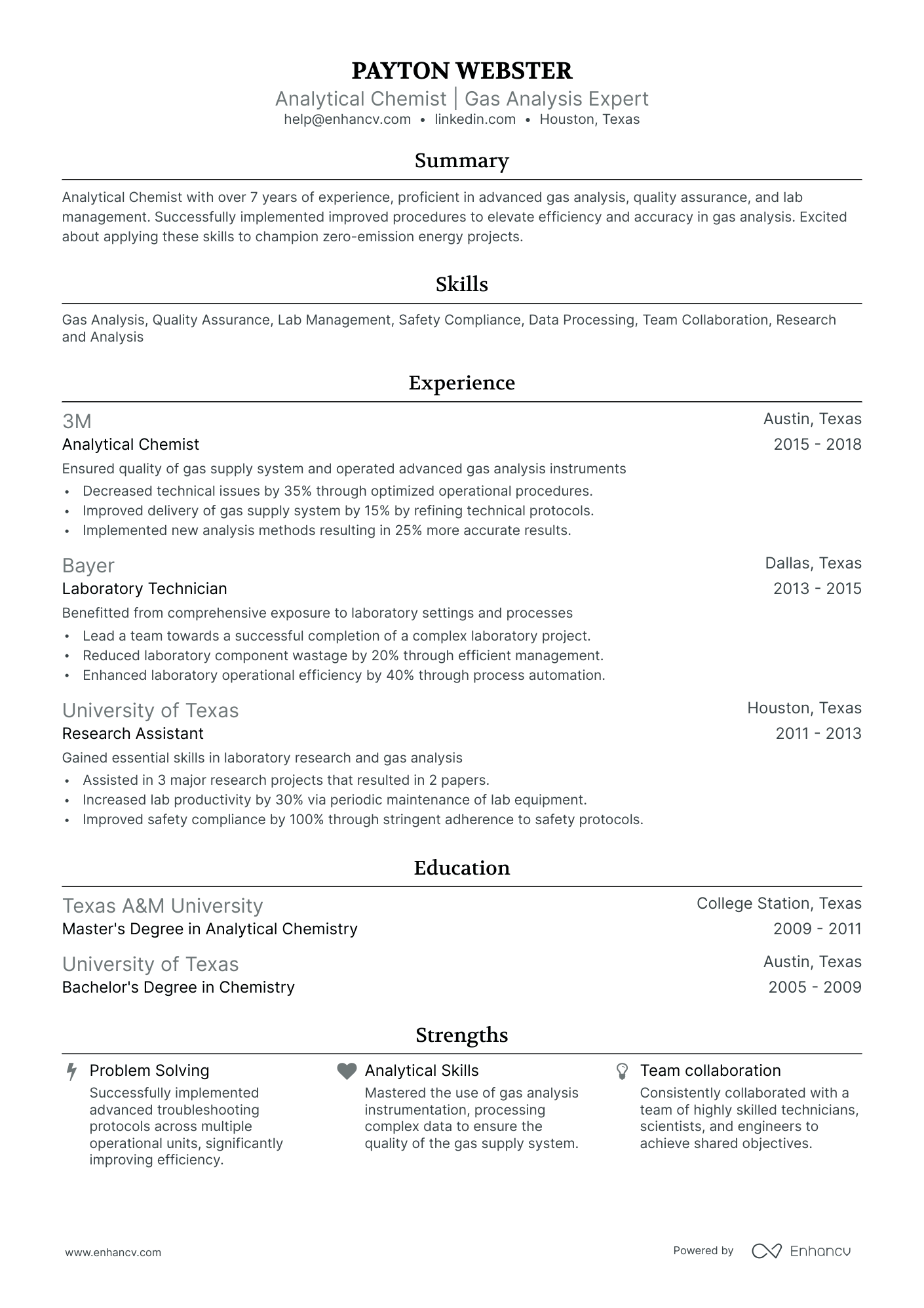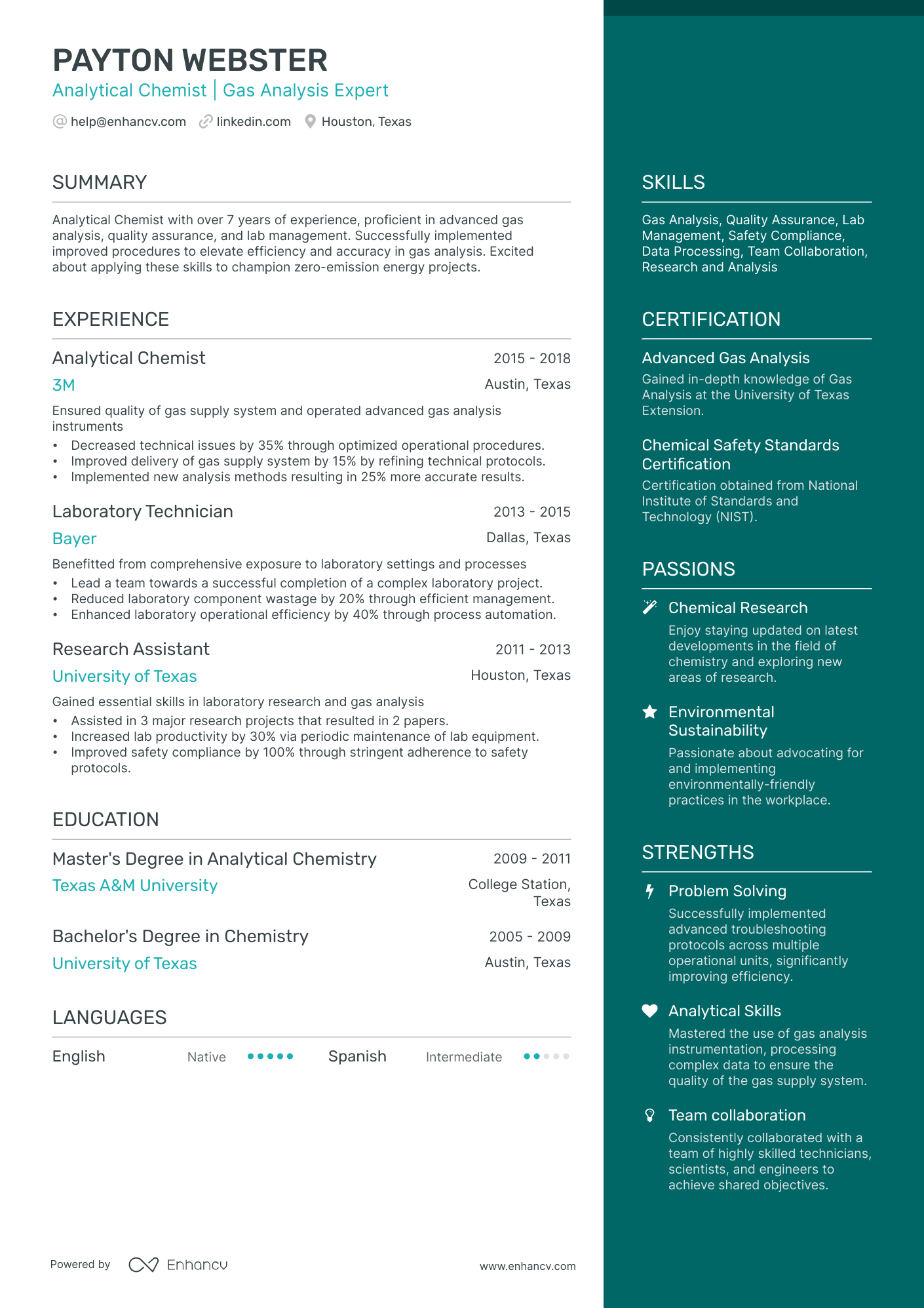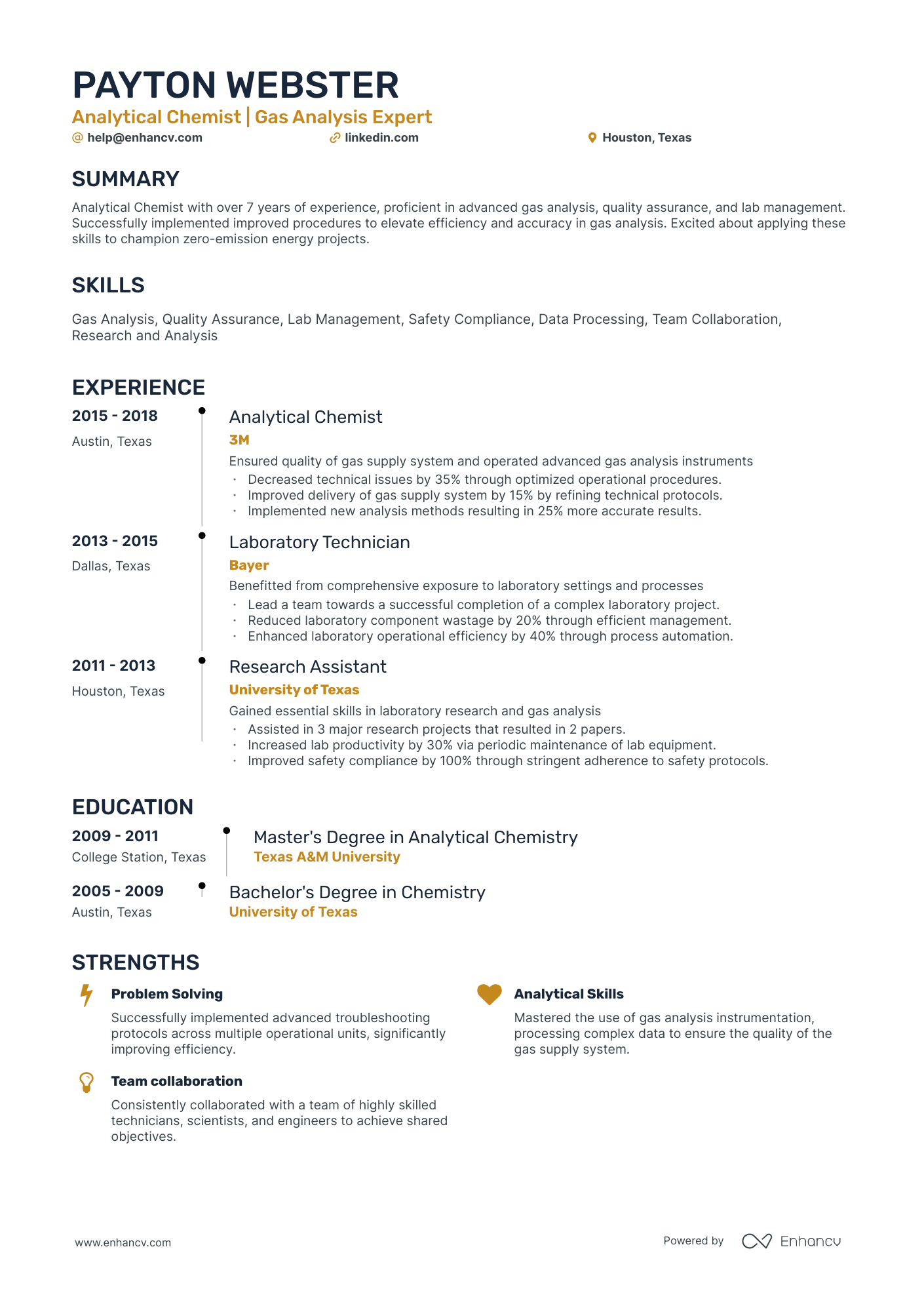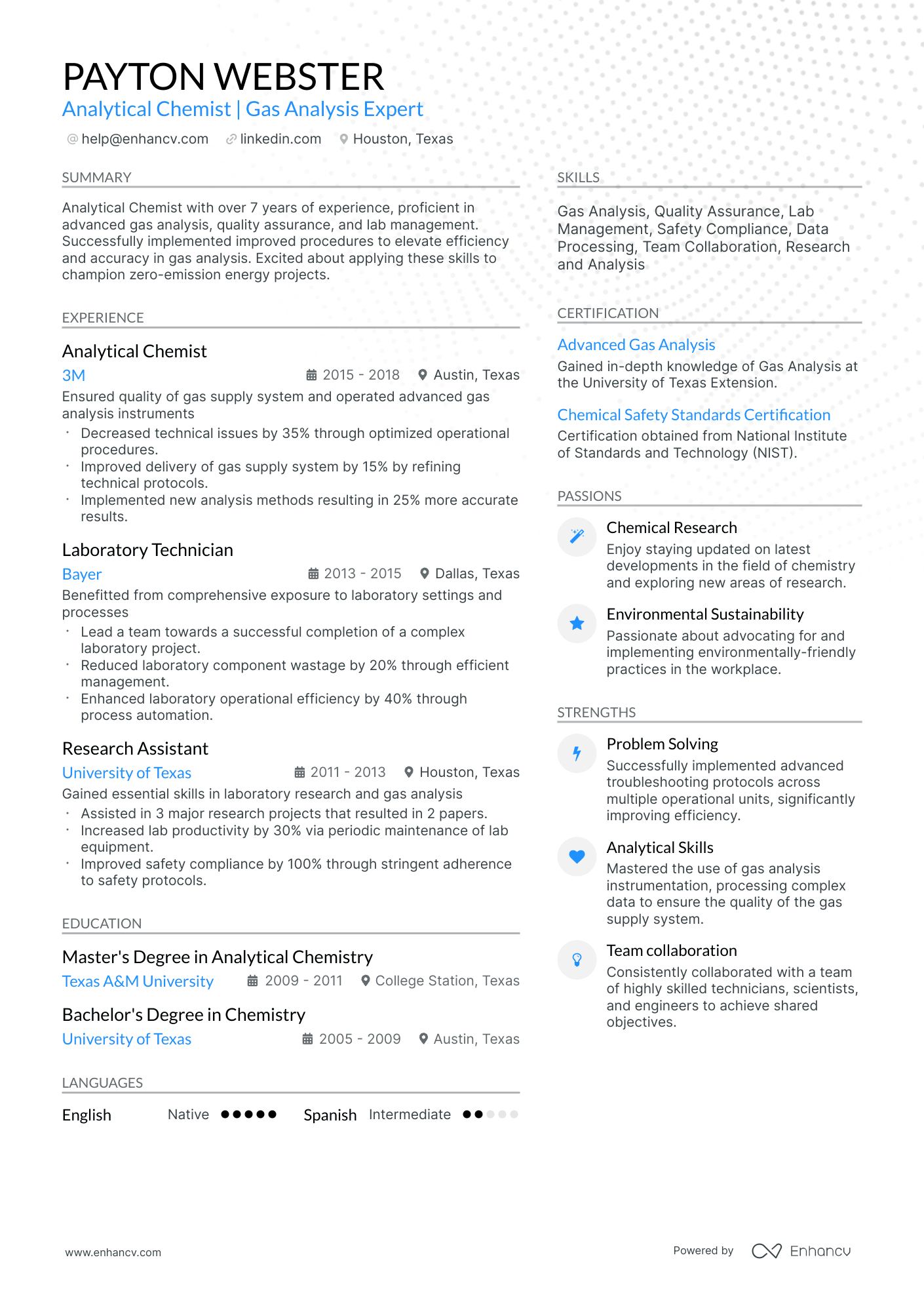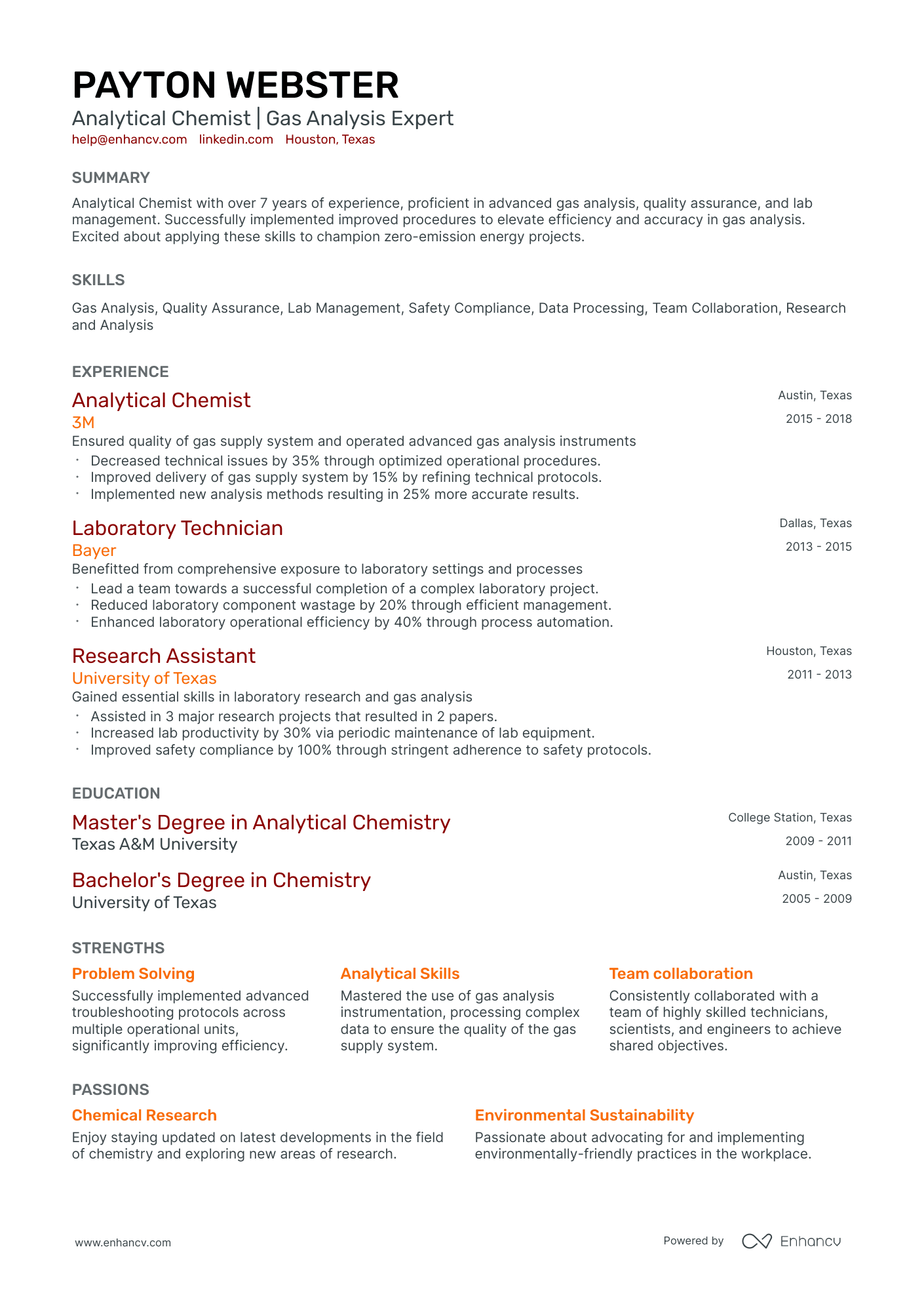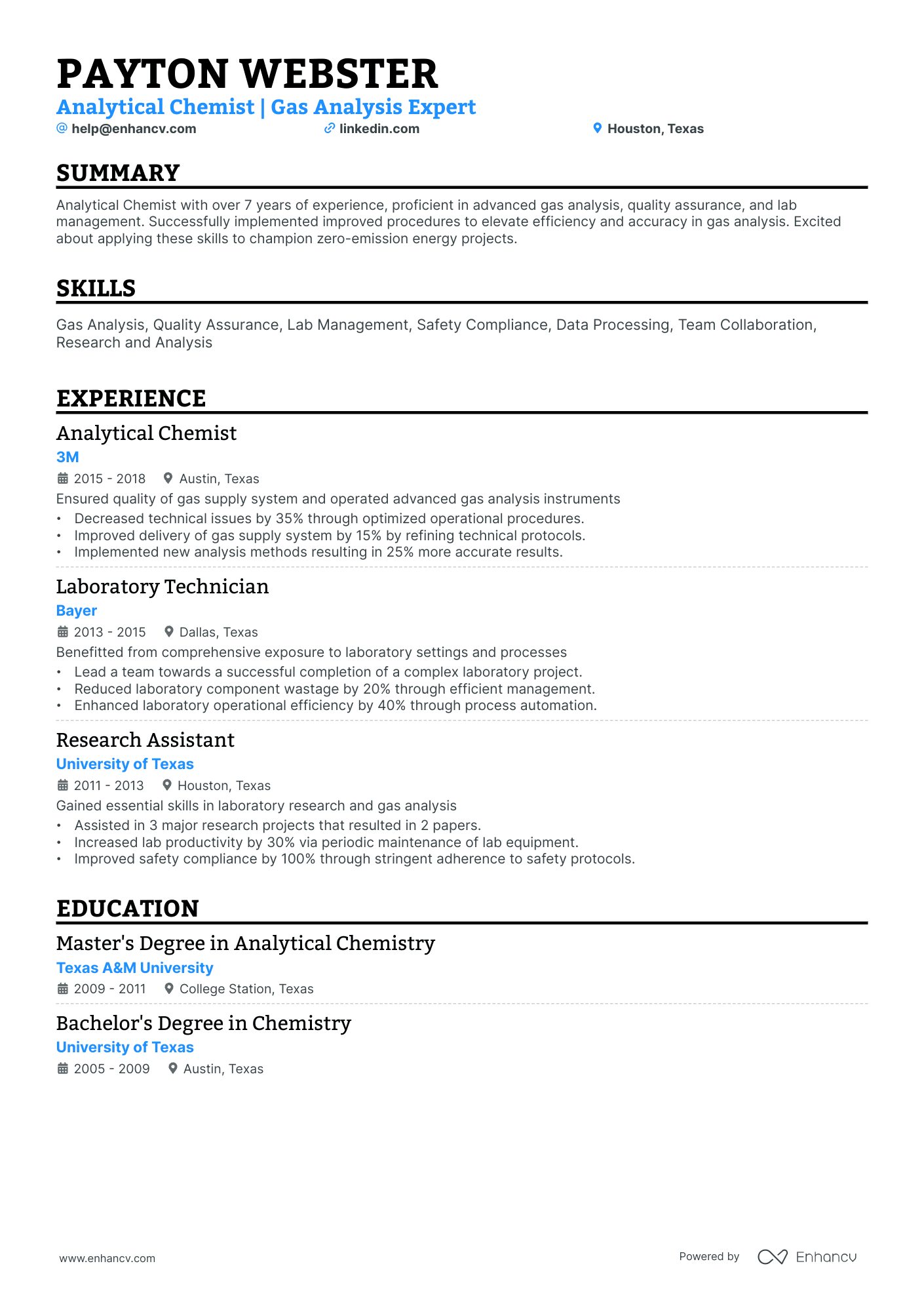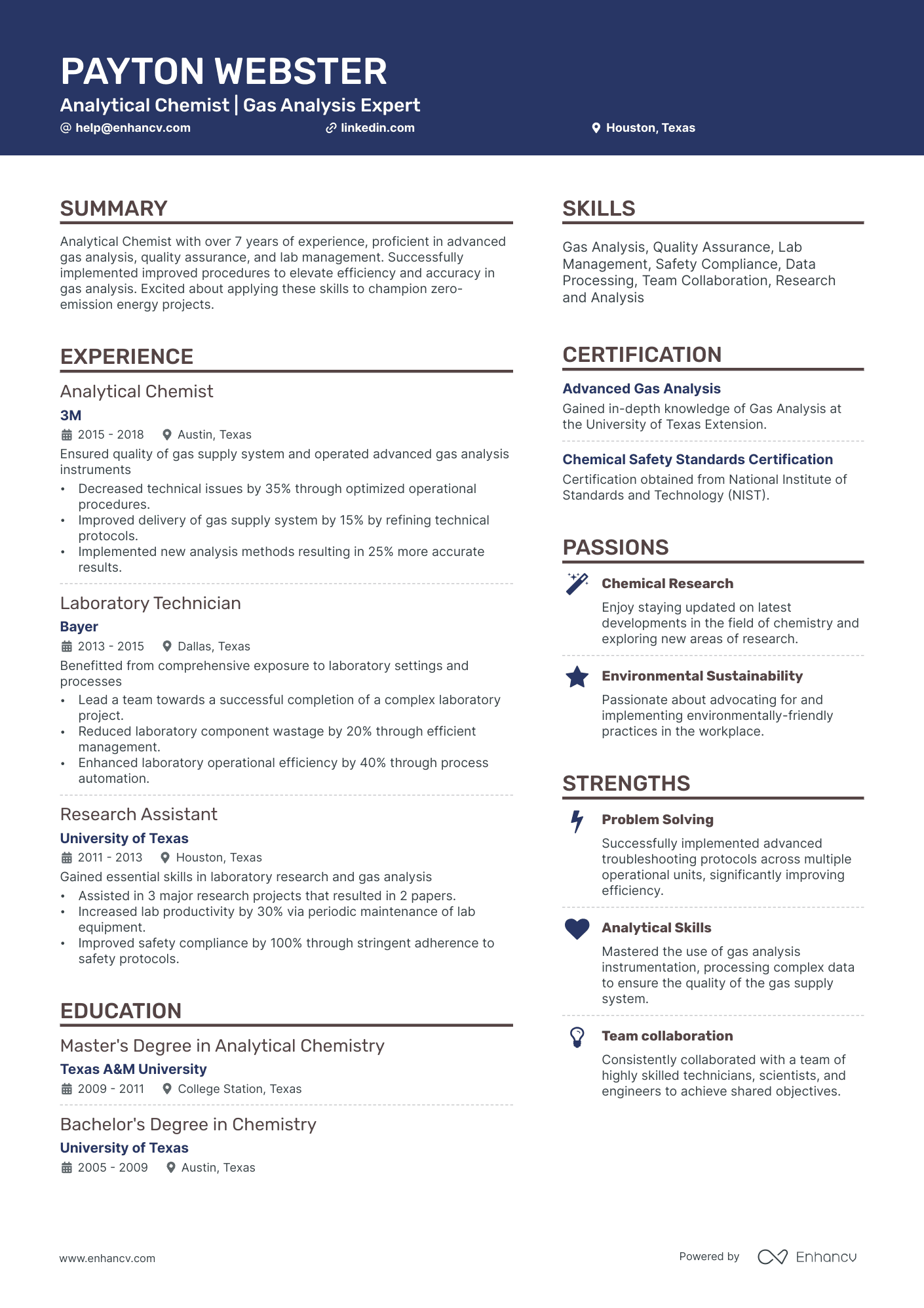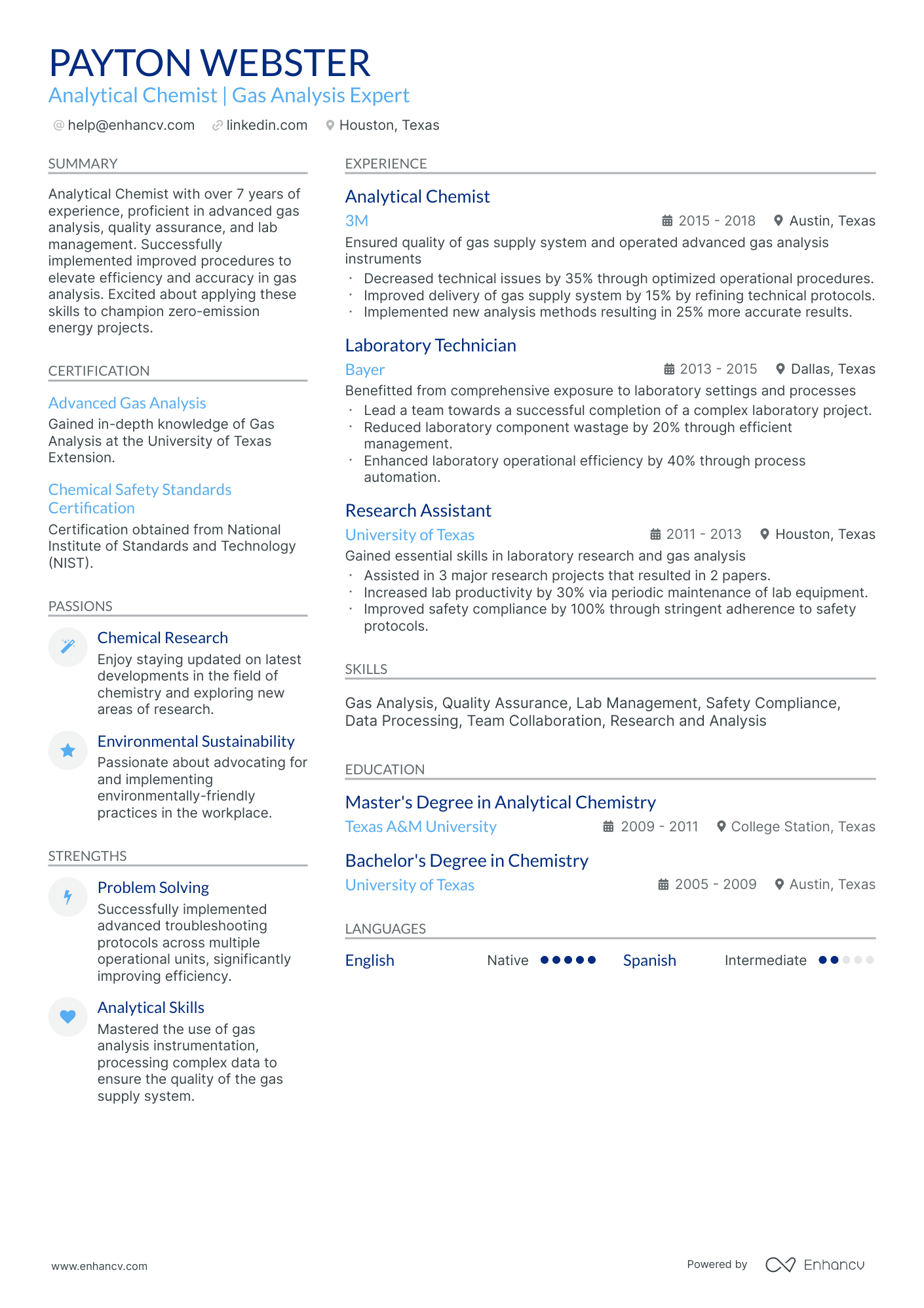Analystical Chemists often struggle with effectively showcasing their detailed, technical skills and diverse laboratory experiences in a concise yet compelling way on their resumes. Our guide can assist in this challenge by providing clear examples and strategies on how to articulate complex chemical experiments and analytical techniques in simple, business-friendly language that hiring managers can easily understand.
Enhance your application for the analytical chemist role with our concise guide on how to:
- Format your analytical chemist resume, ensuring a balance between professionalism and creativity, in line with best practices.
- Align your resume with the analytical chemist job requirements by incorporating relevant industry keywords.
- Utilize distinct resume sections to highlight your skills and achievements, making a case for why you're the top pick for the analytical chemist role.
- Draw from leading analytical chemist resume examples to effectively tailor your experience.
Recommended reads:
Structuring your analytical chemist resume to engage recruiters
The presentation of your analytical chemist resume is crucial.
Is it easy to read and well-organized? Does it have a logical flow?
Avoid overwhelming recruiters with a cluttered document. Instead, follow these best practices to ensure a consistent resume format:
- Include a header in the top third of your analytical chemist resume for easy contact and quick access to your professional portfolio or LinkedIn profile.
- In the experience section, start with your most recent role and detail your career in a reverse-chronological order.
- Unless specified, submit your resume as a PDF to maintain its layout. Some companies might request other formats.
- If you're applying for a senior position and have over a decade of relevant experience, a two-page analytical chemist resume is acceptable. Otherwise, aim for a single page.
Different markets have specific resume styles – a Canadian resume, for instance, may require a different approach.
Upload your resume
Drop your resume here or choose a file. PDF & DOCX only. Max 2MB file size.
Pro tip
Make sure your resume is ATS compliant and catches the recruiters' attention by tailoring your experience to the specific job requirements. Quantify and highlight why you're the best candidate for the role on the first page of your resume.
To craft a compelling analytical chemist resume, focus on these sections:
- A scannable header
- A snapshot of your professional persona, showcasing soft skills, achievements, and a summary or objective
- Skills that align with the job advert
- Quantifiable achievements in your experience section
- An education and technical skills section that underscores your proficiency with specific tools or software
What recruiters want to see on your resume:
- Education: A degree in Chemistry or a related field. Postgraduate degrees, such as a Master's or PhD, may be preferred for more advanced positions.
- Experience with analytical techniques: Proficiency in techniques such as Mass Spectrometry, High Performance Liquid Chromatography (HPLC), Gas Chromatography (GC), Fourier Transform Infrared Spectroscopy (FTIR), etc.
- Lab experience: Hands-on experience in a lab setting, familiarity with lab safety protocols, and use of various laboratory equipment is crucial.
- Data Analysis Skills: Ability to interpret complex data, use statistical analysis tools, and present findings clearly and concisely.
- Certifications and Training: Certifications like ISO 17025 or specific training on Good Manufacturing Practices (GMP), Good Laboratory Practices (GLP), or Quality Control can demonstrate commitment to the role's required competencies.
Recommended reads:
Detailing your relevant experience on your analytical chemist resume
Showcase your credibility in the resume experience section. For an effective analytical chemist resume:
- Highlight measurable achievements.
- Scan the job advert for keywords and integrate them throughout your experience section.
- Emphasize your technical proficiencies and how you've applied them in various roles.
- Keep it simple: mention your responsibility, relevant skills, and the outcomes.
- Use this section to convey your unique value, soft skills, feedback received, and the type of company culture you thrive in.
Top professionals ensure their experience section offers a captivating look at their expertise. Check out our sample analytical chemist resumes for guidance.
- Performed quantitative and qualitative analysis of chemical compounds using spectroscopy and chromatography techniques.
- Developed and validated analytical methods for drug formulation testing, resulting in increased accuracy and efficiency by 20%.
- Collaborated with cross-functional teams to investigate and resolve product quality issues, ensuring compliance with regulatory standards.
- Managed laboratory inventory and equipment maintenance, improving overall productivity and reducing downtime.
- Conducted stability studies to evaluate the degradation kinetics of pharmaceutical products under different storage conditions.
- Led a project to optimize sample preparation techniques, resulting in a 30% reduction in analysis time.
- Performed method transfer and validation for new analytical instruments, ensuring accurate and reliable data generation.
- Collaborated with R&D team to develop new drug formulations, contributing to the successful launch of three commercial products.
- Conducted routine analysis of environmental samples to monitor air and water quality, following EPA guidelines.
- Implemented statistical process control methods to track and improve the precision and accuracy of analytical results.
- Developed and optimized extraction and purification protocols for trace level contaminants, achieving detection limits below regulatory requirements.
- Provided technical expertise in method development and troubleshooting, supporting customer inquiries and resolving analytical challenges.
- Managed a team of analytical chemists and supervised day-to-day laboratory operations.
- Developed and implemented a comprehensive quality management system, resulting in ISO 17025 accreditation for the laboratory.
- Led method development and validation projects for complex matrices, such as food and agricultural samples.
- Collaborated with regulatory agencies to ensure compliance with industry standards and guidelines.
- Conducted analysis of petrochemical samples using gas chromatography and mass spectrometry techniques.
- Performed troubleshooting and maintenance of analytical instruments to minimize downtime and maximize efficiency.
- Developed standard operating procedures (SOPs) for sample handling, data analysis, and instrument calibration.
- Collaborated with cross-functional teams to investigate product quality issues and implement corrective actions.
- Conducted forensic analysis of drug samples to support law enforcement agencies in criminal investigations.
- Provided expert witness testimony in court proceedings regarding analytical findings and interpretations.
- Developed and validated methods for the detection of emerging drugs and novel psychoactive substances.
- Collaborated with external research organizations on collaborative projects to advance forensic analytical techniques.
- Managed method transfer and validation activities for pharmaceutical products, ensuring compliance with regulatory guidelines.
- Developed and optimized dissolution testing methods for solid dosage forms, resulting in improved formulation performance.
- Collaborated with formulation scientists to evaluate the impact of manufacturing process changes on product quality.
- Provided technical support to manufacturing facilities, troubleshooting analytical issues and implementing corrective actions.
- Design and execute analytical experiments to assess the quality and stability of medical devices.
- Develop and validate test methods to ensure compliance with relevant regulatory standards.
- Collaborate with engineering teams to investigate failures and identify root causes, contributing to design improvements.
- Conduct risk assessments and provide technical expertise in support of regulatory submissions.
- Performed analysis of agricultural samples to determine pesticide residues using liquid chromatography-mass spectrometry (LC-MS).
- Developed and validated multi-residue methods to improve analysis throughput and sensitivity by 40%.
- Collaborated with agronomists and farmers to develop strategies for minimizing pesticide usage while maintaining crop yield.
- Managed data analysis and reporting, ensuring accurate and timely delivery of results to clients.
- Conducted research and development of new analytical methodologies for environmental monitoring.
- Published several scientific papers on the application of advanced spectroscopic techniques in environmental analysis.
- Collaborated with academic institutions on joint research projects, securing external funding for innovative studies.
- Mentored junior scientists and provided technical guidance in experimental design and data interpretation.
The following content includes information from "O*NET OnLine" by the U.S. Department of Labor, Employment and Training Administration (USDOL/ETA). Used under the CC BY 4.0 license. The data represents the top responsibilities present on the task lists for analytical chemist professionals.
Top Responsibilities for Analytical Chemist:
- Develop, improve, or customize products, equipment, formulas, processes, or analytical methods.
- Analyze organic or inorganic compounds to determine chemical or physical properties, composition, structure, relationships, or reactions, using chromatography, spectroscopy, or spectrophotometry techniques.
- Induce changes in composition of substances by introducing heat, light, energy, or chemical catalysts for quantitative or qualitative analysis.
- Conduct quality control tests.
- Write technical papers or reports or prepare standards and specifications for processes, facilities, products, or tests.
- Maintain laboratory instruments to ensure proper working order and troubleshoot malfunctions when needed.
- Prepare test solutions, compounds, or reagents for laboratory personnel to conduct tests.
- Confer with scientists or engineers to conduct analyses of research projects, interpret test results, or develop nonstandard tests.
- Evaluate laboratory safety procedures to ensure compliance with standards or to make improvements as needed.
- Direct, coordinate, or advise personnel in test procedures for analyzing components or physical properties of materials.
Quantifying impact on your resume
<ul>
Building a analytical chemist resume when experience is sparse
If you're light on relevant experience, consider highlighting:
- Short-term roles or internships undertaken during your academic years.
- Contractual roles, emphasizing their relevance and the outcomes achieved.
- Alternative resume formats, such as functional or hybrid, that spotlight your skills.
- Research roles, especially if they involved significant projects or if your contribution was pivotal to the project's success.
Recommended reads:
Pro tip
If your experience section doesn't directly address the job's requirements, think laterally. Highlight industry-relevant awards or positive feedback to underscore your potential.
Analytical chemist resume skills: showcasing both hard and soft skills
Your analytical chemist resume should show recruiters your range of skills. List the tools and software you use (hard skills) and how they fit into your daily tasks. But don't stop there. Share the personal traits (soft skills) you've gained from your experiences. Here's how:
- Showcase three top career achievements.
- For each achievement, mention a hard and a soft skill you used.
- Highlight unique skills that set you apart.
- Discuss how your skills improved the workplace or team culture.
Check our list for popular hard and soft skills in the industry.
Top skills for your analytical chemist resume:
Chromatography
Mass Spectrometry
Spectrophotometry
Titration Techniques
Electrochemical Analysis
Gas Chromatography-Mass Spectrometry (GC-MS)
High-Performance Liquid Chromatography (HPLC)
Nuclear Magnetic Resonance (NMR) Spectroscopy
Sample Preparation Techniques
Data Analysis Software (e.g., ChemStation, LabSolutions)
Attention to Detail
Problem Solving
Critical Thinking
Communication
Time Management
Teamwork
Adaptability
Organizational Skills
Technical Writing
Project Management
Next, you will find information on the top technologies for analytical chemist professonals from "O*NET OnLine" by the U.S. Department of Labor, Employment and Training Administration (USDOL/ETA). Used under the CC BY 4.0 license.
Top technologies for Analytical Chemist’s resume:
- Microsoft Access
- Structured query language SQL
- Apple iWork Keynote
- Microsoft PowerPoint
- Minitab
- Waters Empower Chromatography Data Software
Pro tip
Double-check the spelling of all skills and tools on your resume. Remember, software like the Applicant Tracker System (ATS) scans for these details.
Detailing your education and top analytical chemist certifications on your resume
Your education section can reflect a variety of skills and experiences relevant to the position.
- List post-secondary qualifications, noting the institution and duration.
- If you're currently studying, mention your expected graduation date.
- Exclude qualifications unrelated to the role or industry.
- If relevant, delve into your educational background, especially if it was research-intensive.
Including both relevant education and certifications on your analytical chemist resume can set you apart. It not only showcases your qualifications but also your commitment to the profession.
When listing these on your analytical chemist resume, make sure to:
- Highlight degrees and certificates relevant to the role.
- Mention the awarding institution for credibility.
- Include the start and end dates, or if the education/certification is ongoing.
- If relevant, incorporate a few keywords from the job advert within the description of the certification or degree.
If you have additional certifications not directly related to the role, consider placing them towards the end of your resume. This way, they can be viewed as personal interests rather than core qualifications.
For a quick update, check out our list of popular analytical chemist certifications curated by the Enhancv team.
Best certifications to list on your resume
Pro tip
Remember, certifications can be woven into various resume sections, like experience or summary. Detail how a particular certification enhanced your performance or opened new opportunities.
Recommended reads:
Adding a summary or objective to your analytical chemist resume
One of the most crucial elements of your professional presentation is your resume's top one-third.
This most often includes:
- Either a resume summary - your career highlights at a glance. Select the summary if you have plenty of relevant experience (and achievements), you'd like recruiters to remember about your application.
- Or, a resume objective - to showcase your determination for growth. The perfect choice for candidates with less experience, who are looking to grow their career in the field.
If you want to go above and beyond with your analytical chemist resume summary or resume objective, make sure to answer precisely why recruiters need to hire you.
What is the additional value you'd provide to the company or organization?
Now here are examples from real-life analytical chemist professionals, whose resumes have helped them land their dream jobs:
Resume summary and objective examples for a analytical chemist resume
- Detail-oriented analytical chemist with over 10 years of experience in pharmaceuticals, and a proven record of developing and optimizing novel methodologies. Skilled in chromatography, spectroscopy and titration techniques. Successfully implemented cost-saving quality control procedures which enhanced laboratory efficiency by 15%.
- Accomplished scientist boasting 8 years of experience in environmental chemistry. Expert in employing cutting-edge technology to analyze soil and water samples. Commended for precision and maintaining high levels of quality assurance, resulting in a 20% decrease in errors during analysis processes.
- Experienced in data analytics and machine learning, seeking to leverage these skills as an analytical chemist. Recognized for developing predictive models from complex datasets, can bring a unique perspective to problem solving in chemical analysis.
- Former quality assurance specialist aiming to transition into the field of analytical chemistry. Armed with a strong foundation in laboratory operations and product testing protocols. Known for meticulous nature and aptitude for data interpretation.
- A recent graduate with a Bachelor's degree in Chemistry seeks entry-level position in analytical chemistry. Passionate about laboratory work and committed to applying knowledge gained through academic coursework in real-world environments. Strives to contribute towards process optimization in a dynamic setting.
- Chemistry postgraduate keen to apply theoretical understanding in a practical setting as an analytical chemist. With a sound grasp of laboratory safety protocols and a commitment to continuous learning, aims to contribute positively to a team that values accuracy and efficiency.
Optimize your resume summary and objective for ATS
Drop your resume here or choose a file.
PDF & DOCX only. Max 2MB file size.
Four additional sections to consider for your analytical chemist resume
To give a fuller picture of who you are, consider adding these sections to your analytical chemist resume:
- Awards - to showcase your achievements.
- Interests - to share passions outside of work.
- Publications - to highlight your contributions to the field.
- Projects - to spotlight significant accomplishments, even those outside of traditional work settings.
Key takeaways
- Craft a analytical chemist resume that's easy to read and aligns with the role's requirements.
- The top third of your resume should clearly convey your unique value proposition for the analytical chemist role.
- Tailor your resume to the job, highlighting skills, achievements, and the tangible results of your efforts.
- Detail your certifications and technical skills to demonstrate proficiency with specific tools and technologies.
- The sections you choose should collectively present a comprehensive view of your professional expertise and personality.
